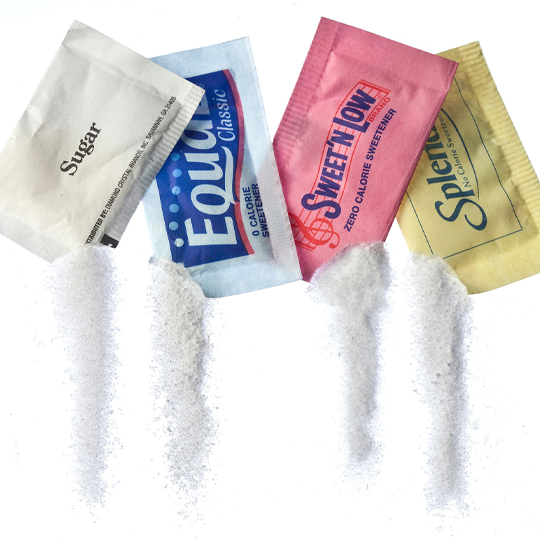We get asked frequently about the "added sugars" listed on our nutrition fact panel. The truth is, the FDA recently required labeling honey as an "added sugar" despite it being a natural sweetener. Instead of using sugar alcohols, chicory root fiber syrup, and artificial sweeteners, we prefer to keep things real and use natural sweeteners like dates and honey - which are rich in antioxidants, easily digestible, won't upset your stomach, and provides that real taste that stevia can't compete with.
A large variety of different sweeteners are used in bars-- from natural ones like dates and honey to processed ones like sugar alcohols to refined sugars to brown rice syrup, not all sweeteners are created equal. In this article, we break down the effects of different sweeteners used in bars and explain why companies might use these different sweeteners.
Dates As A Sweetener
Dates are tropical stone fruits that come from trees called date palms. They are native to the Middle East and are often sold in stores dried.
Why they are used: Dates have lots of fiber, are natural sweeteners, and are a good source of potassium and minerals which help lower blood pressure. They are also low in moisture, making them a great binding agent for bars.
Effects of dates: Prevention of degenerative diseases, development of peptic ulcers, and chronic inflammation; anti-viral, anti-bacterial, and anti-fungal; helps with glycemic control in diabetic patients
What Are The Benefits Of Honey?
Honey is a sweet and viscous liquid produced by honey bees and other related insects. Honey has been used in medicine for over 5,000 years and is used to replace sugar in foods.
Why it is used: Honey has high amounts of beneficial plant compounds and antioxidants, is natural, and serves as a good binding agent for bars.
Effects of honey: Honey is anti-bacterial and has uses in chronic wound healing and combating infections; reduces duration of diarrhea, lowers blood pressure, cholesterol, and triglycerides; improves heart health
Is Stevia A Safe Sweetener?
Stevia is a substitute for sugar that comes from the Stevia plant and has no calories. Stevia provides both a sweet and bitter taste to humans. Stevia leaves are 200-300 times sweeter than cane sugar.
Why it is used: It is natural and safe for diabetics because it does not affect blood sugar levels; a very small amount is needed to achieve desired sweetness, and it is calorie-free.
Effects of stevia: Anti-fungal, anti-bacterial; relieves upset stomach; possible downsides include that it may harm gut bacteria and may increase cravings for sweet foods.
Why Sugar Alcohols Are Bad For You (ex: sorbitol, mannitol, xylitol, erythritol)
Sugar alcohols are carbohydrates in which the aldehyde group is switched to a hydroxyl group. They are found naturally or processed from other sugars. Sugar alcohols are found in many processed foods.
Why they are used: Sugar alcohols are low-calorie or zero calorie molecules and are used for product texture, preservation, and holding moisture. They do not increase blood glucose levels and are therefore recommended for people with diabetes.
Effects of sugar alcohols: Digestive problems (due to body’s inability to digest them) such as gas, bloating, nausea, and diarrhea; as well as weight gain. No thanks.
Artificial sweeteners (ex: sucralose)
Artificial sweeteners are also known as non-nutritive sweeteners, meaning they offer no nutritional benefits (such as vitamins and minerals) and are low in calories or have no calories.
Although artificial sweeteners have been approved for consumption by the FDA, it is no secret that physicians and dietitians have recommended that they still be avoided for health reasons.
Why they are used: For companies to market their products as having “low sugar” content and “lower calories” (as opposed to natural sweeteners)
Effects of artificial sweeteners: Weight gain (associated with overeating due to “lower calories” consumed via bars sweetened with artificial sweeteners), increased BMI, heart disease, metabolic syndrome, bloating, migraines, acid reflux
Refined sugars (ex: high fructose corn syrup, cane sugar, brown sugar, fructose)
Refined sugars come from processed sugar cane or sugar beets and have been stripped of all nutrients and fiber. Essentially, refined sugars can be seen as “empty calories” because they offer no nutritional value and instead just contribute to weight gain and health risks.
Why they are used: They improve taste of foods and are cheaper than other natural sugars like honey, maple syrup, etc.
Effects of refined sugars: Mood changes, buildup of fat (especially around waistline), high blood pressure, heart disease, obesity, mood disorders, diabetes
Brown Rice Syrup (also known as rice syrup or rice malt)
Brown rice syrup comes from -- you guessed it -- brown rice. Brown rice itself is nutritious, however, when being processed into brown rice syrup, almost all of its nutrients are stripped, leaving brown rice syrup with only small amounts of minerals. Heads up, it is the first ingredient listed in GoMacro bars, indicating that it mostly consists of brown rice syrup.
Why it is used: As a healthier alternative to high fructose corn syrup; it is a plant-based sweetener with stickiness that acts as a good binding agent
Effects of brown rice syrup: Increased cancer risk (due to arsenic), weight gain, diabetes, heart disease, high blood pressure
Sources:
Dates - http://www.ijfans.org/temp/IntJFoodNutrSci3663-6348539_173805.pdf
Honey - https://www.honey.com/files/general/refguide.pdf
https://foodinsight.org/stevia-sweeteners-another-low-calorie-option/
Sugar alcohols - https://link.springer.com/article/10.1007/s00217-015-2437-7
Artificial sweeteners - https://www.heart.org/en/healthy-living/healthy-eating/eat-smart/sugar/nonnutritive-sweeteners-artificial-sweeteners#:~:text=The%20American%20Heart%20Association%20labels,calories%2C%20depending%20upon%20the%20brand.
Refined sugars - https://www.helpguide.org/articles/healthy-eating/choosing-healthy-carbs.htm
Brown rice syrup - https://ehp.niehs.nih.gov/doi/full/10.1289/ehp.1104619

